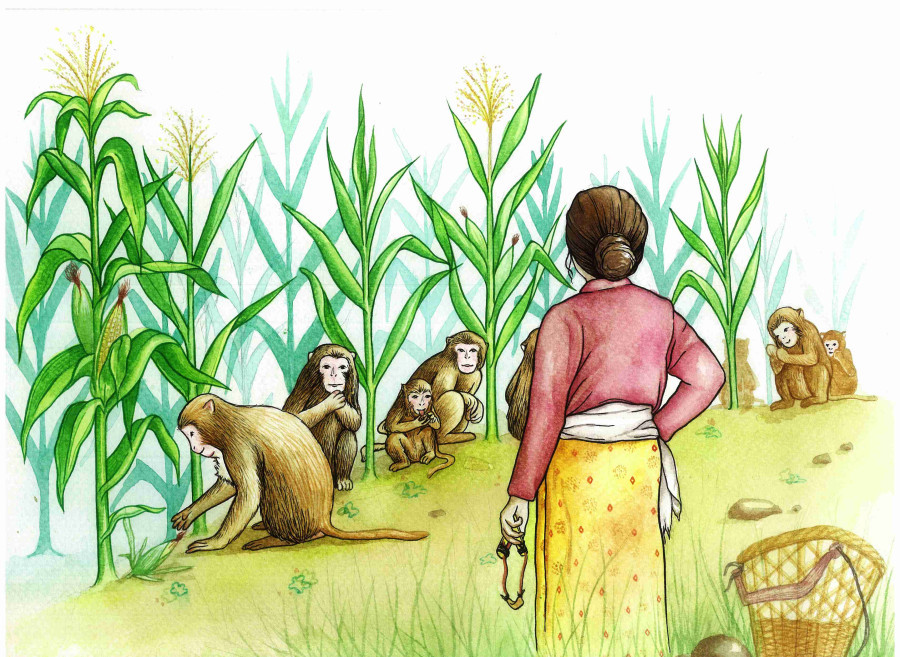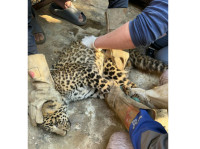Gandaki Province
Authorities scramble to tackle monkey menace in Gandaki
The onslaughts of monkeys in villages have terrorised the locals and affected agriculture of farming communities.
Deepak Pariyar
On January 29, chairman of ward 19 of Pokhara Metropolitan City issued a public notice urging people to participate in a campaign to fell trees in their property, purportedly to control the growing number of monkeys from entering the villages.
Ward chief Pushpendra Pandey called for public support to make the ‘I will cut down my trees’ campaign effective. The public notice asked people to cut down trees on their property within 10 days. He claimed the move would help control the rhesus macaque monkeys locally called rato bandar.
While some troubled locals praised the initiative and extended their support to the ward chief, the majority of the public deemed the notice insensitive and pointless. Following criticism from environmentalists and conservationists, the metropolitan office scrapped the notice within 24 hours.
Pandey claimed that people had misunderstood his request and misjudged the word ‘campaign’ in the notice.
“Monkeys have become a real threat to the locals. They enter the kitchen and eat whatever they find. They also attack people. At least eight to 10 people are injured in monkey attacks every year,” he said. “The locals urge us to invest our resources to control the monkeys instead of undertaking other development activities. These are desperate times for them. I had called for clearing bamboo clumps and only tall trees, near people’s houses, not all trees. But people misunderstood me.”
The majority of critics suggested finding a sensible alternative to controlling the monkey menace. But locals say they have adopted every possible solution and failed. The local units have invested time, effort and money to solve related problems, says Pandey. Gandaki Province government allocated Rs1.5 million to ward 19 of Pokhara Metropolis this fiscal year to control the monkey menace. The ward issued Rs300,000 for the same purpose.
“The ward office now plans to redirect the monkeys to the forests by planting fruit trees in and around the forests,” said Pandey. “Earlier there were trees of wild fruits like hog plum and Tiju among others in the forests so the monkeys stayed there. But such trees were cut down. Now we are planning to plant such trees so that the monkeys find food in the forests and won’t come to the settlements.”
According to him, the ward office planted chayote in the areas surrounding the forests hoping the monkeys would live off them and leave the villagers alone. “But it didn’t work. The chayote fruits and leaves were eaten mainly by deer,” he said.
Ward 19 in Pokhara Metropolitan City, however, is not the only local body in Gandaki Province desperately looking for solutions to the monkey menace.
Wards 6, 8 and 14 of Waling Municipality in Syangja district have also undertaken similar campaigns to cut down trees in an attempt to deprive the monkeys of a place to live.
Bodhraj Kunwar, chairman of ward 14 of Waling, says he sees no other recourse. “What else can we do? We have adopted every measure to stop the monkeys, but nothing has worked,” he said. “We have started clearing bushes and cutting down tall trees around houses as there is no other alternative.”
In Gulmi, the local people of ward 1 of Resunga Municipality have also started cutting down fodder trees, bamboo, pine and khari (Celtis australis) trees on their property.
People’s representatives say the local residents whose mainstay is farming have incurred huge losses in the past due to monkeys. They have, therefore, resorted to cutting down trees and clearing bushes to protect their crops.
Last year, the ward office hired a guard for 45 days to chase away monkeys, but they could not keep monkeys from crop fields.
The authorities concerned, people’s representatives and other stakeholders have a unanimous view on the issue. However, they have not been able to find a feasible solution to their collective problem.
Purneshwar Subedi, forest officer at the Division Forest Office in Kaski, says hewing down trees is definitely not the solution to controlling monkeys.
“One can cut down trees growing on their private property except for the species restricted by the government. It, however, is not a good practice to fell trees indiscriminately,” he said. “That would harm the environment in the long run.”
In the fiscal year 2017-18, Rupa Rural Municipality in Kaski had allocated a budget of Rs1 million to tackle the monkey menace. With the budget, the rural municipality trapped around 600 monkeys and released them in a national park. “Around 75 percent of the problems caused by the monkeys were resolved for around four years. Agricultural production doubled during that period, but the monkeys have started returning,” said Navaraj Ojha, chairman of Rupa Rural Municipality.
Ojha says it is not easy to control monkeys as the country’s laws do not permit their killing or their export to foreign countries, and national parks do not allow relocation of these animals in their territories. “The government should change its policies and follow the example of Sri Lanka, which exported monkeys to China. If we can export our monkeys, it could boost agricultural production and help reduce migration caused by monkeys,” said Ojha.
Galyang Municipality in Syangja had also allocated Rs1.5 million budget to control monkeys in the fiscal year of 2018-19. The municipality asked the local people to domesticate the monkeys and provided money for their upkeep. Some locals took up the challenge but gave up after some time due to the difficulty of taming the primates.
The Gandaki provincial government has announced the launch of programmes to control monkeys in its policy and programme for the current fiscal year of 2023-24. “Special programmes will be launched in the monkey-affected areas to support dairy and meat sectors, and cultivate crops with export potential,” reads the government’s policy and programme document. The provincial government allocated Rs15.2 million in the budget this year to promote livestock farming in the monkey-affected areas.
Despite the efforts, the government has yet to find the right measures to control the monkey menace. The provincial Ministry of Industry, Tourism, Forest and Environment spent Rs1 million in the last fiscal year to study monkey management. The study refrained from recommending any stringent measures to control monkeys citing their significance in people’s religious beliefs—Hindus worship monkeys as god Hanuman. The study said sterilisation and capture methods are unlikely to effectively control arboreal populations.
Nepal is home to three species of monkeys—the Rhesus macaque (Macaca mulatta), the Assamese monkey (Macaca assamensis) and the Hanuman langur (Semnopithecus entellus).
Nepal is a signatory to the Convention on International Trade in Endangered Species of Wild Fauna and Flora (CITES), the global treaty that regulates trade in species under threat. That rhesus monkeys are listed in CITES means their international trade is restricted. An Act to Regulate and Control International Trade in Endangered Wild Fauna and Flora prohibits the export of wild animals and plants without government permission. One is jailed, according to the act, for five years to 15 years or fined Rs500,000 to Rs1 million or both if found guilty.
Similarly, the National Park and Wildlife Conservation Act also has included the rhesus monkey on the list of protected animals, thereby prohibiting its export without government permission. However, the Act does not mention any measures for controlling protected animals that threaten people and agricultural production.
The federal government designated the wild boar as a wildlife species deemed harmful to agriculture by publishing a notice in the Nepal Gazette on November 23. This provision allows for the chasing, capturing or killing of wild boars without permission in cases of damage to private farms. But the government refrained from deciding on monkeys fearing potential religious unrest.
Ramchandra Kandel—forest secretary at the provincial Ministry of Industry, Tourism, Forest and Environment—suggests setting up ‘monkey parks’. “I proposed setting up such parks when I was the director general of the Department of National Park and Wildlife Conservation. But it was not possible due to budget constraints,” said Kandel.
Jaimini Municipality in Baglung, a hill district of Gandaki Province, is planning to build a ‘conservation park’ for monkeys to stop the monkey scare in the area. The local unit prepared a study report with the aim of completing the park within three years.




 9.83°C Kathmandu
9.83°C Kathmandu.jpg)











